You are here
New Releases
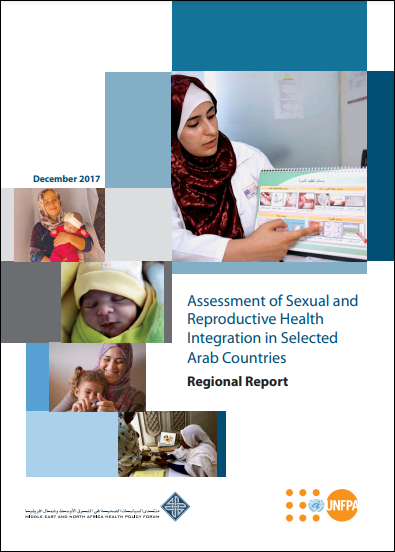
Assessment of Sexual and Reproductive Health Integration in Selected Arab Countries Regional Report
Assessment of Sexual and Reproductive Health Integration in Selected Arab Countries Regional Report

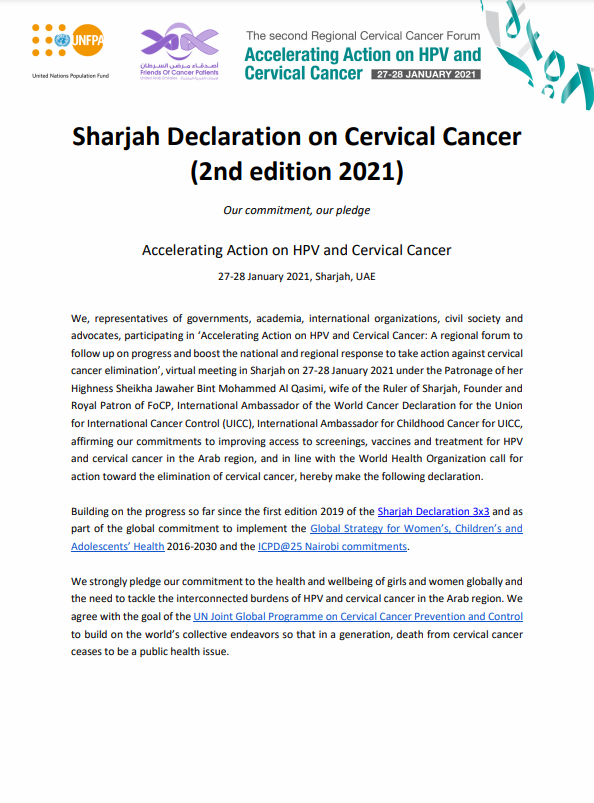
Sharjah Declaration on Cervical Cancer (2nd edition 2021)
Sharjah Declaration on Cervical Cancer (2nd edition 2021)
Our commitment, our pledge
Accelerating Action on HPV and Cervical Cancer 27-28 January 2021, Sharjah, UAE
We, representatives of governments, academia, international organizations, civil society and advocates, participating in ‘Accelerating Action on HPV and Cervical Cancer: A regional forum to follow up on progress and boost the national and regional response to take action against cervical cancer elimination’, affirming our commitments to improving access to screenings, vaccines and treatment for HPV and cervical cancer in the Arab region, and in line with the World Health Organization call for action toward the elimination of cervical cancer, hereby make the following declaration
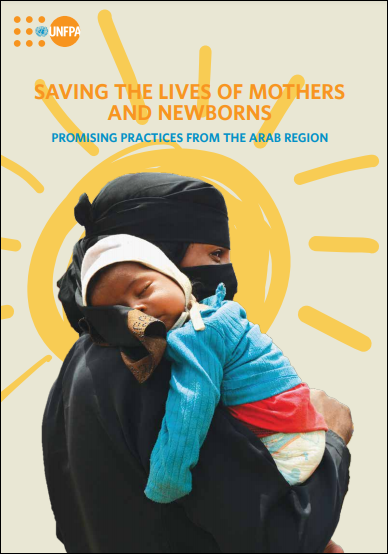
SAVING THE LIVES OF MOTHERS AND NEWBORNS
This publication presents a compilation of promising maternal health programming practices from selected Arab countries: Algeria, Morocco, Oman, Tunisia, and Yemen. It is the result of a competition that was organized by the UNFPA Arab States Regional Office in 2020.
An internal technical committee selected the five best practices included in this publication. UNFPA country offices with support from national expert consultants and national counterparts worked on documenting the identified practices.
Special thanks to all who contributed to the documentation, and more importantly, those who have designed and implemented these practices in the field to help those most in need.
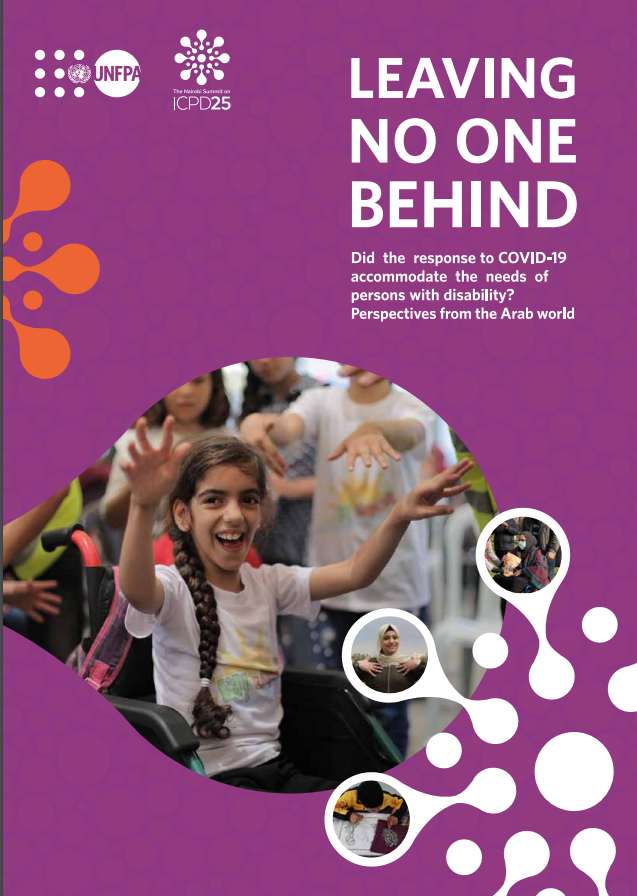
LEAVING NO ONE BEHIND: Did the response to COVID-19 accommodate the needs of persons with disability? Perspective from the Arab World
In response to COVID-19, social development dialogues re-energized advocacy efforts to advance disability inclusion in development on the global, regional, and national levels, as well as humanitarian settings.
The global pandemic is exposing pre-existing inequalities. During normal times, persons with disabilities face more discrimination, violence, and barriers to access information, education, and services while they should be able to equally access all services.
This Paper highlights the additional barriers that persons with disabilities face during such difficult times.
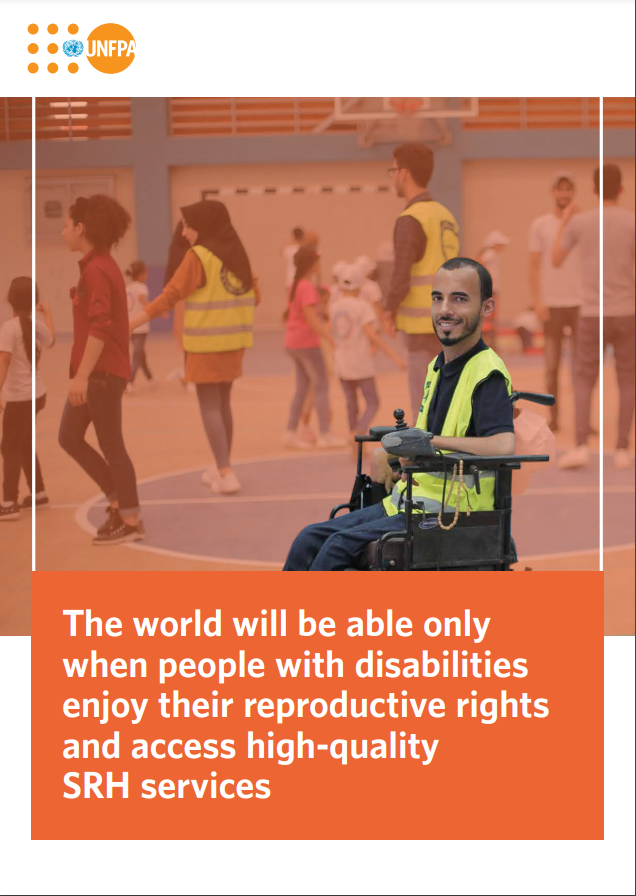
The world will be able only when people with disabilities enjoy their reproductive rights and access high-quality SRH services.
- Inclusive and provide holisitc SRH services and policies.
- Increased awareness among politicians, decision makers of existing international and national legislation.
- Increased and better data collection on and for persons with disabilities.
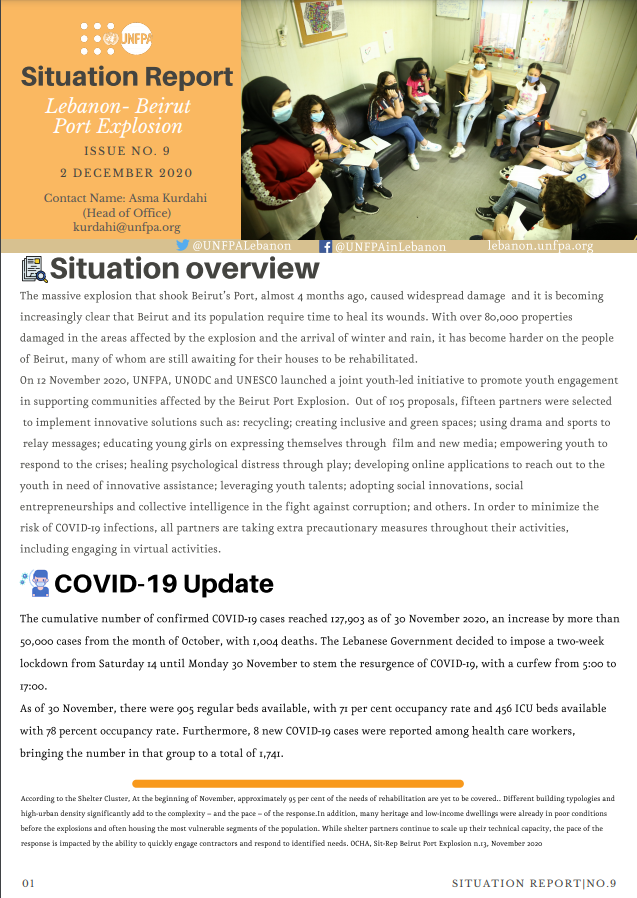
Beirut Explosion Situation Report No.9
The massive explosion that shook Beirut’s Port, almost 4 months ago, caused widespread damage and it is becoming increasingly clear that Beirut and its population require time to heal its wounds. With over 80,000 properties damaged in the areas affected by the explosion and the arrival of winter and rain, it has become harder on the people of Beirut, many of whom are still awaiting for their houses to be rehabilitated.
On 12 November 2020, UNFPA, UNODC and UNESCO launched a joint youth-led initiative to promote youth engagement in supporting communities affected by the Beirut Port Explosion. Out of 105 proposals, fifteen partners were selected to implement innovative solutions such as: recycling; creating inclusive and green spaces; using drama and sports to relay messages; educating young girls on expressing themselves through film and new media; empowering youth to respond to the crises; healing psychological distress through play; developing online applications to reach out to the youth in need of innovative assistance; leveraging youth talents; adopting social innovations, social entrepreneurships and collective intelligence in the fight against corruption; and others. In order to minimize the risk of COVID-19 infections, all partners are taking extra precautionary measures throughout their activities, including engaging in virtual activities.
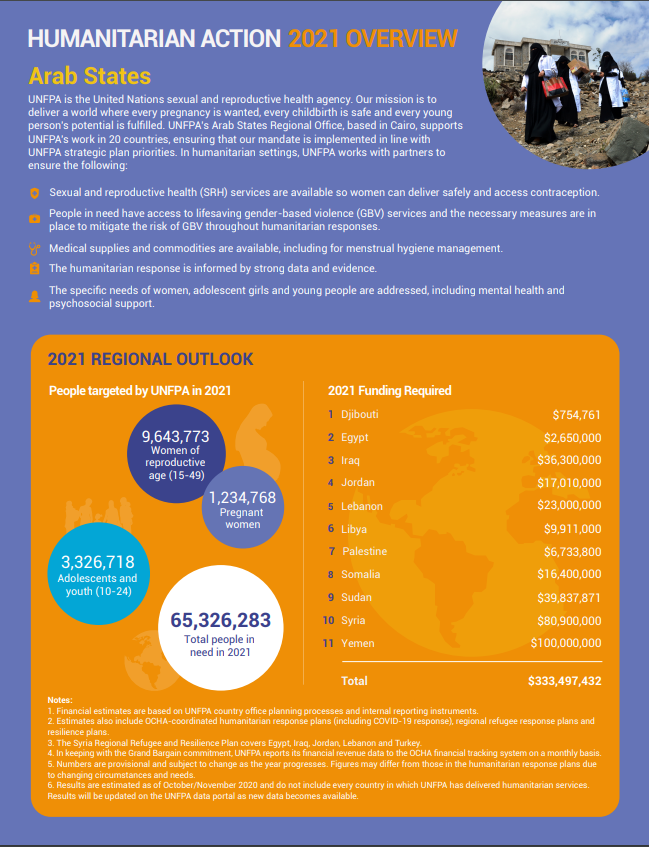
Arab States - Humanitarian Action 2021 Overview
Women do not stop giving birth, and risks of gender-based violence increase during conflicts and disasters. The COVID-19 pandemic has underscored existing inequalities and the disproportionate impact of crises on women and girls. In response, UNFPA’s life-saving work is more important than ever.
The UNFPA Humanitarian Action 2021 Overview highlights the needs and rights of women and adolescent girls in emergencies, which are often overlooked. UNFPA is appealing for $818 million, to reach 54 million women, girls and young people, including 35 million women of reproductive age, 29 million adolescents and young people, and over 4 million pregnant women in 68 countries.

UNFPA Impact Assessment Fact Sheet / Regional Syria Crisis Response
In 2020, UNFPA conducted the 4th regional external assessment of the agency’s programming in the Syria regional response, commissioned by UNFPA Regional Syria Response Hub.
The overall aim of the 2020 impact assessment is to examine if the services provided at UNFPA-supported delivery points (health facilities, women and girls’ safe spaces, outreach points, and youth centres) are achieving the intended objectives. This includes assessment and review to measure, primarily: (a) whether UNFPA-supported services have contributed to improved physical and psychosocial wellbeing of those in need of gender-based violence (GBV) prevention and response services and those in need of sexual and reproductive health (SHR) services; and (b) whether UNFPA-supported services have increased availability, accessibility, and acceptability of quality GBV and SRH services.
This fact sheet provides a concise snapshot of the main findings, achievements, and recommendations that emerged from the assessment process.
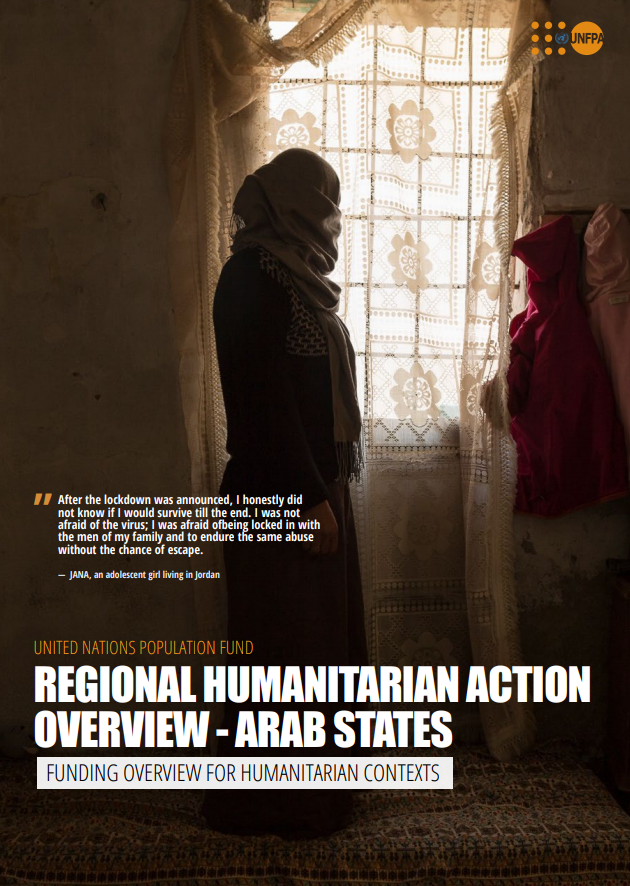
REGIONAL HUMANITARIAN ACTION OVERVIEW - ARAB STATES: FUNDING OVERVIEW FOR HUMANITARIAN CONTEXTS
The Arab Region is witnessing compounded humanitarian crises, the effects of which have become catastrophic. Some of these are protracted, as in Yemen, Syria, and Libya, while others have become forgotten, as in Somalia and the Palestinian territories. Meanwhile, the COVID-19 pandemic has pushed even more people behind safety lines to face gender-based violence and harmful practices against women and girls, who consistently bear the brunt of the challenges resulting from these crises.
In 2021, both the Syria and Yemen crises will mark their tenth years, while recent crises in Sudan, Ethiopia, and Lebanon will cause additional displacements and disruptions in community networks, placing the lives and dignity of millions of people at risk. The lingering aftermath of the humanitarian situations in Palestine, Iraq, Somalia, and Libya also continue to produce numerous and protracted challenges that require strategic responses.
UNFPA is appealing for a total of US$ 333.5 million to support its humanitarian programmes throughout the Arab States in 2021. The funds will be allocated to meet the urgent needs of more than 65 million people across 11 countries currently responding to far-reaching and protracted humanitarian crises.
This document provides an overview of the achievements and funding requirements for UNFPA’s various humanitarian programmes throughout the Arab Region, in addition to offering a glimpse into the strategies and priorities that will be adopted over the course of the year.